Gary Neal Hansen's Blog, page 43
July 28, 2016
Is There Life OUTSIDE of Seminary? (Letters to a Young Pastor)

 cc by Herry Lawford 2.0
cc by Herry Lawford 2.0Dear ______:
I agree: when you are in seminary it can be hard to build relationships beyond that intense Christian community. But you do need a life OUTSIDE of seminary.
When I wrote to recommend that you have a real church home while in seminary (despite the comings and goings for field education and so forth) I was thinking about that.
I went to a large seminary and the student body was pretty diverse in many ways. It wasn’t that we all thought alike, that is for sure. But as the buildings on the perimeter of the campus faced inward to the quad, that community tended to focus pretty constantly on itself.
Sometimes it was obsession with an upcoming event, when first year students had their first OT midterm, or when the seniors sat for their ordination exams. On campus you could hardly talk about anything else — while in the world at large it didn’t matter at all.
Other times it was more subtle: students would want to raise a protest about some horrible thing in the world (there are always serious problems to shed a light on) and we would try get the faculty and administration to sign onto petitions and declarations.
Seminary community life is very different for students and for faculty, and inevitably the roiling passions of the students met with resistance from faculty and administration — even when those very faculty members were actively working on those same issues on the national stage.
You need a life OUTSIDE of seminary
Nothing adds perspective to your life inside a campus community like real relationships OUTSIDE that campus.
One woman in my seminary class always seemed more level headed than the rest of us. She wasn’t worried about the ups and downs that consumed most of us.
It turned out she was a member of a local ski club. She had good friends whose lives were lived in other orbits.
That kept her sane during her studies. I suspect it also served her very well in ministry after seminary.
You’ll need a life OUTSIDE the church
Here’s the deal: if you become a pastor of a church it becomes very hard to ever even meet people outside the church. If you have any hope of preaching to anyone outside the proverbial choir, you’d better figure out how to have some friends in the larger world.
Blessings,
Gary
The post Is There Life OUTSIDE of Seminary? (Letters to a Young Pastor) appeared first on Gary Neal Hansen.
July 25, 2016
Why Time Management Is Futile — And A Better Goal

 Time management is futile
Time management is futileThe tricky thing about attempts at time management? The goal is wrong. Time management is futile.
Time is completely beyond anyone’s control. Time simply is, and it goes flowing by without asking my permission or changing to my will.
If you am going to attempt to manage something, it must be something that you can control — or at least influence.
So instead of “time management,” better to set your sights on “self-management.”
The one thing you can control is your self — and even that is an overstatement.
“Teach us to number our days,” says the Psalmist. That is a pretty small starting point, actually. Just number them. Keep track of them as they come up with their well and poorly spent hours and minutes.
Teach us to number our days,
that we may gain a heart of wisdom. (Psalm 90:12, NIV)
A small step, but a good one. Maybe what Duhigg calls a “keystone habit.”
Numbering our days
Pay attention. Log the time spent on projects, the words written written on works in progress. If I number those days, turn the invisible shifting of time into actual numbers, I’ll be aware of each step forward — and that will be rewarding enough to keep me taking steps.
And I’ll be aware of gaps, neglected tasks, too.
We need help for self-management
The writer of the Psalm is onto something in another direction too: he makes this a prayer. Teach us, he begs, to number our days.
He knows that left to his own devices he isn’t going to pay that much attention.
St. Anselm thought that elemental sin was misuse of our will — the one thing we are given some control of. We were intended to devote that will to God and God’s purposes, but we turn it to different, lower goals. Anselm thinks of this as a kind of theft.
St. Augustine, half a millennium earlier, wrestled with the consequences of our misuse of our will. Whether as a species or as individuals, by turning our wills away from God’s will, we become damaged.
Each of us is like an athlete with a muscle tear. Range of motion is lost and must be repaired.
So that’s my prayer today in my work as a writer: I’m asking God to teach me to number my days.
I wish it were automatic and easy. It isn’t. I have to work up a spreadsheet, note my time, log my word-count. That’s part of getting my inner life in order.
That’s the shift from futile time management to the workable, if challenging, goal of self management.
——
This post contains an affiliate link.
The post Why Time Management Is Futile — And A Better Goal appeared first on Gary Neal Hansen.
July 21, 2016
Yes, You Do Need a Church (Letters to a Young Pastor)
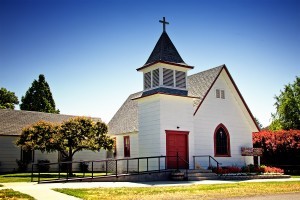
 cc by Steven Pavlov-SA 3.0
cc by Steven Pavlov-SA 3.0Dear ______:
Sounds like the first summer of seminary has brought to light a common problem: You no longer have a church. Yes, you do need a church.
Yes, as I wrote last week this season is a great opportunity to visit churches of other traditions. But you still need one church to be your community, your support, your home base.
Is seminary better than church?
Those who go leave their church to attend a residential seminary often face this challenge.
You find yourself surrounded by the good fellowship of other students.
You have people pray with.
You worship with them in chapel.
Sometimes seminary is like the church on steroids. With so many friends who are passionate and growing, it can seem better than your old church.
So who needs a church? You need a church.
Seminary is not a church
Your seminary is a ministry of the church. So of course it does things that any community of Christians should do.
But it is not itself a church. Or to speak more accurately, it is not a congregation.
It may or may not have steady pastoral leadership.
It likely does not have the structure of governance and leadership that that any denomination would say its congregations need.
It does not start with babies and new believers, and walk with them, building their lives as disciples, all the way to the grave.
It typically does not even have a Sunday service, a mark of Christian congregations since the Book of Acts.
The seminary, is a temporary Christian community, nurturing the faith of those who are accepted to its programs.
The seminary, at its core, is an academic institution. It is a place to earn the degree required of ministers in your denomination. It just happens to be a Christian academic institution, aiming to form you as a fit leader for the Church. So of course it does many of the things a congregation will do — but it will leave others undone.
You need a church
Many of your needs for learning and nurture will be met by the community in seminary. But many won’t. You may not feel those needs acutely, but they are still there.
You need the seven-day rhythm of life, with worship and sacrament on the Lord’s Day.
You need to hear the Word in ways that point you away from the enmeshed life of seminary and into the ordinary wider world.
You need all the generations of God’s people — crying babies, goofy teens, elders wise and frail.
You need continuity. Each intense class comes to an end. Come graduation time, one third of your friendship network moves on.
But the congregation? It just hangs on in there.
It takes work of course. You have to make an effort to let some of your roots grow in a congregation when your relationships in seminary are so intense.
Make your life match your message
But there is one more thing: Being part of a congregation now will prevent you from feeling like a hypocrite later.
If you are called to be a pastor of a congregation, you will work day in and day out to get people to worship weekly, and to anchor their Christian lives in the church.
Those people live in a culture that has a thousand alternatives to participating in your congregation. Many of those alternatives are more intense than church life. Many overlap with the church and meet some of the same needs.
If you come to be a pastor after a three year vacation from a congregation, your life will bear witness to your belief that the church is optional.
So find a congregation. Show up for worship. Put down some roots.
Blessings,
Gary
The post Yes, You Do Need a Church (Letters to a Young Pastor) appeared first on Gary Neal Hansen.
July 20, 2016
The Prophet Elijah: Fire or Grace?

 Prophet Elias (public domain)
Prophet Elias (public domain)Today the Orthodox Church commemorates one of the great figures of the Old Testament: the prophet Elijah, or Elias. Since for the last couple years I regularly participated in the Vespers service at St. Elias Greek Orthodox Church in Dubuque I wanted to reflect a bit on their patron saint.
He is remembered as the “Prophet of Fire,” and that rings true to the stories told of him.
In his famous grudge match with the prophets of Baal, Elijah prayed and God sent fire from heaven to burn up a waterlogged sacrifice. (1 Kings 18:36-38)
On the mountain, waiting for God to pass by, after whirlwind and earthquake came fire. (1 Kings 19:11-12)
When King Ahaziah sent 50 soldiers to arrest him, Elijah called down fire from heaven to destroy them — twice. (2 Kings 1:9-12)
When his life on earth was over, God took him to heaven in a flaming chariot driven by flaming horses (2 Kings 2:11)
I suspect that those who model their ministry on the prophets like this kind of thing. Drama and power are intoxicating.
Perhaps the most interesting prayer of the service for the day goes another direction:
Seeing humanity’s great iniquity and God’s measureless love for humanity, Elias the Prophet was angry and troubled and spoke uncompassionate words to the compassionate God. “Vent Your wrath,” cried he, “on them who renounced You, O Judge most just.” But in no way did he move the heart of the Good to punish the ones who renounced Him. For He ever awaits the repentance of all, as the Lord who alone love humanity. (Ages Digital Chant Stand)
So there is another lesson to be drawn from Elijah — a message of grace.
Grace and compassion are embodied in other aspects of the prophet’s ministry, as when he ensured a widow had food in a time of famine, and raised her son from death. (1 Kings 17:8-24)
More importantly, you see grace and compassion in what Elijah received from God.
In that time of famine, God guided Elijah to a source of water, and directed ravens to bring him food. (1 Kings 17:1-6)
When the source of water failed, God directed the prophet to the widow and promised her grain and oil would not fail if she cared for Elijah. (1 Kings 17:7-9)
When he was afraid and depressed because the queen was seeking to kill him, God instructed Elijah to rest and provided him food and water until he was able to cope again (1 Kings 19:1-9)
And when Elijah, still pretty whimpery, complained that he was the only person left who loved God, God revealed that there were still 7000 faithful, and gave him Elisha for a servant. (1 Kings 19:13-21)
God’s tender care of Elisha is a constant feature of the text. God had called Elijah, and God provided every step of the way.
The fireworks and violence were not what the prophet chose. Those were just his strange direct instructions from God. They don’t come with a command to “Go and do likewise.”
But we can learn from the way God cared for Elijah. We too can learn to look for God’s grace and compassion all around us. We can be grateful.
That gracious compassion is something we can imitate. We can share it with others. If we go and do likewise our character will be more like God’s.
The post The Prophet Elijah: Fire or Grace? appeared first on Gary Neal Hansen.
July 14, 2016
Closed Communion: It’s Not About You (Letters to a Young Pastor)

 cc by Waiting for the Word 2.0
cc by Waiting for the Word 2.0Dear ______:
Glad to hear that you are using some of these summer Sundays to visit churches of other traditions. It is the best way to broaden your real knowledge of what worship is, and to sense first hand the diversity of the Body of Christ.
(And do it now or you’ll lose your chance — if you take a call as a pastor they are going to want you to show up on Sundays.)
Closed Communion
But now you’ve stumbled on an uncomfortable fact: closed communion. When you travel across the boundaries of global Christianity into a Catholic or Orthodox congregation, or even within some branches of Protestantism, you find you are not invited to receive the sacrament of the Lord’s Supper.
You are not the first Protestant to feel hurt or insulted or enraged or all three. After all, our typical stance is that the Table is open to all who trust Christ as Lord and Savior — or more technically, for all baptized believers.
I’m doing a bit of visiting around too just now: I recently worshipped with a Coptic Orthodox Church for the first time. That’s the branch of Orthodoxy centered in Alexandria — the home of such greats as St. Athanasius, St. Cyril, and the Desert Fathers and Mothers.
I found it totally cool to get completely lost (since most of the liturgy was in Coptic and Arabic) even though we were all turning our hearts in worship to the same God and Christ. I could still let the ancient and unfamiliar music draw my heart to God in praise.
And a kind man gave me a English-Coptic-Arabic copy of the Liturgy so I could fumble my way forward.
Turns out the music in Coptic worship rocks. The congregation’s chanting of prayers and hymns moved me, body and soul. I’ve never before encountered any instrumental music in an Orthodox congregation, so was amazed to hear them use these cool little cymbals for polyrhythmic accompaniment.
Anyway, I knew going in that the Liturgy would be a celebration of the Eucharist. And I knew I would not be able to participate. But I knew it wasn’t about me.
It’s Not About You
Closed communion is hard to understand for North Americans because our culture is so passionately individualistic.
We want to be judged on our own personal commitment to Jesus — so we feel like we are being told we aren’t Christian enough.
And we know the unity of his followers was a huge issue for Jesus. It is what he prayed about the last night before his death. (Check out John 17 sometime.)
So there is a tragic irony when the Sacrament that communicates the deep reality of our unity as Christ’s Body becomes something that sheds light on our divisions.
The Coptic Orthodox Church has not been in communion with the larger part of Orthodoxy since about the year 451.
And Orthodoxy as a whole has not been in communion with the Western Church since the year 1054.
And Protestant Churches have not been in communion with the Catholic Church since the decades following 1517 when Luther’s 95 Theses kicked off the Reformation.
So Christians not being welcome at other Christians’ tables is nothing new.
What About My Faith?
People try to resolve the offense sometimes by saying “It’s because you don’t believe the same things we do about the Eucharist.”
But that still assumes it is a problem of individual faith. It isn’t.
It is because that our Churches are not in communion with each other. It is about our corporate life — the faith of our denominations.
And here’s the kicker: it is because the larger Church you belong to really does matter.
Christ has put his Sacraments in the hands of his Body. The Churches to which we belong, faulty as they are, are the expression of that Body, and are responsible to administer his Sacraments faithfully to the members of the Body.
When the Body is divided, our sacramental life is divided. The ability, or inability, of the Churches to grow into unity shapes the way the members of the Churches can encounter other Churches.
That is, if my Church is not in communion with the Church I visit, I am not personally excluded. My denomination is excluded — and I am part of it.
It is not about me. It is about the relationships between the parts of the Body to which we belong.
A Call to Prayer
Instead of offense, it should bring a call to prayer for healing.
Every time you encounter a Christian from a tradition that is not in communion with your own, join in Jesus’ own prayer:
… that they may be one, as we are one, I in them and you in me, that they may become completely one, so that the world may know that you have sent me and have loved them even as you have loved me. (John 17:22-23 NRSV)
So keep visiting. Keep learning — there is so much to learn from Christians from other traditions.
And keep praying for healing of Christ’s broken Body.
Blessings,
Gary
The post Closed Communion: It’s Not About You (Letters to a Young Pastor) appeared first on Gary Neal Hansen.
June 2, 2016
How Do You Make Sense of Theology? (Letters to a Young Pastor)

 via Flikr, cc by Raoul Luoar 2.0
via Flikr, cc by Raoul Luoar 2.0Dear ______:
After my last couple of letters I’m shocked (shocked) to find you are not yet convinced of the value of your Church history course.
Okay, I’m no more shocked than Captain Renault was to find there was gambling going on in Rick’s Café Américain. (If you don’t know the reference, watch Casablanca. You need more than current pop culture to be truly hip.)
History is a hard sell these days. Partly that is because it is often taught very very badly — the kind of history Arnold Toynbee criticized as “just one damn thing after another.”
Partly, though, the problem is in our culture: we only value what is new and fresh, or at least improved.
But for you, as you journey through seminary there is a particular value to history that you should really hang on to:
History makes sense of theology.
You are in a “theological seminary,” after all. If you don’t aim to understand theology you are in the wrong place.
How do you make sense of theology?
Here’s the problem:
If an intelligent Christian of average education picks up a book exploring any of the great theological issues, there is a very good chance the book is going to seem abstract. Fatally, boringly, abstract.
The topic may be as important as the Trinity, or the natures of Christ, or justification. If you jump straight into the argument, it can seem like people are just pushing ideas around like pieces on a chess board.
Now that you’ve had a Church history class I hope that you can see that the three issues I just named are actually things that Christians have fought over, been driven into exile over, even died over.
And if you’ve had a good Church history class you know the human stories that shaped the arguments. You know that for the people involved, these were not matters of abstract speculation.
They fought and suffered because they saw that salvation itself hung in the balance.
They saw that if certain answers were true, then Christian faith does nothing to save us.
Other answers, very particular answers, showed we have a faith worth holding to the death.
Only certain answers interpreted the Bible reasonably. Only certain answers showed that God in Christ was able to solve the human problem — and that God in Christ has actually done so.
Knowing the stories of how and why the arguments happened enables you to understand the teachings that the Church came up with as a result. And that’s theology.
History + Theology = Clarity
And all of this prepares you really well for your next year in seminary.
At your school, like many others, intro Church history courses come early, and then you take the intro theology courses. I think that is an excellent way to order things.
When you dive into theology, you will meet those ideas again. But now your mind will already be filled up with the stories, with people, with life-and-death struggles behind the ideas. Theology won’t be abstract any more.
In fact, it works both ways. Next year, this year’s study of Church history is going to help you make sense of theology. But you’ll also find that theology is helping you make sense of Church history.
And taken together, you’ll begin to find that those concrete people and those abstract ideas begin to make sense of why the Church is how it is today.
And that can help you be a lot wiser as a minister in a challenging changing world.
Blessings,
Gary
————
Wish you had a better working knowledge of the history of Christianity? What would you say to taking a mini-course, either individually or with a small group? Click the button below to sign up for the waiting list.
The post How Do You Make Sense of Theology? (Letters to a Young Pastor) appeared first on Gary Neal Hansen.
May 26, 2016
Knowing the Church’s Story (Letters to a Young Pastor)

 5 Generations, cc by Christine Furtado 2.0
5 Generations, cc by Christine Furtado 2.0Dear ______:
I’m glad to hear that you are at least looking for some “friends” from your readings in Church history. I think that is one good reason to study Church history, whether you are in seminary or not — but it isn’t by any means the only reason.
One key thing you gain from a study of history is a better knowledge of yourself as a Christian, and ourselves as the Church. Knowing the Church’s story can help you make wise decisions individually or in leadership.
Maybe that seems like too bold a claim. Here’s why I make it: One of the biblical understandings for the people of God is that we are a family. Studying Church history is like going to a family therapist.
Family Therapy
If you ever decide to see a therapist, you’ll probably start out by telling stories. You’ll tell your own personal stories. But your therapist will tug on the loose ends and you’ll end up telling stories about the family you grew up with. Eventually one thing will lead to another and you’ll be telling the family lore, the influential people whom you never actually met.
Some of those family stories are role models and mentors: the sainted grandmother you always wanted to be like.
Some of those stories will be cautionary tales: the alcoholic parent who treated you so badly.
Some of the stories will just be a little uncomfortable: like that certain branch of the family tree that nobody wants to talk about.
But all of the stories matter, because all of those people have shaped you.
Keep the stories hidden and they rule you in the most awkward and surprising ways.
Get the stories out there and you can think about what you want to do with them.
That’s the path to greater health.
Knowing the Church’s Story
That is true in the Church as well.
The history of the Church is not all good. That would be nostalgia.
There have been some horrible things done by Christians. Honesty requires acknowledging them — repenting where necessary, and choosing a better path.
The history of the Church is not all bad either. That would be denial.
At the very least, everyone who follows Christ today can thank a chain of witnesses, known or unknown, back through the generations. Somebody helped you hear the gospel. That’s a piece of history.
There are also those remarkable servants of the poor, those brilliant interpreters of Scripture, those effective spiritual guides, and so many other categories — all those friends from the past I wrote to you about. We get to learn from them. That’s a piece of history too.
And there are those family fights — those great controversies and theological struggles you are learning about in class. Issues that seem distant and abstract today (say the Trinity or the Natures of Christ) were wrestled and died over. The fights, and the issues at stake, are part of the way history shapes us.
Honor Your Father and Mother
And, as the late great Church historian David Steinmetz liked to point out, this is part of obeying the command to honor your father and mother (Exodus 20:12 — it’s one of the Big Ten).
You do not have to like everything about your parents or ancestors. You just have to treat them with respect and learn what you can from them.
And as my long-ago pastor Bruce Larson would point out, sometimes you best honor them by growing up and living differently.
So as you study for that exam, remember that you are in Christian family therapy. Learn the stories — they are your family, and they make you who you are.
I pray it equips you to be a wise disciple and a wise leader.
Blessings,
Gary
————
Wish you had a better working knowledge of the history of Christianity? What would you say to taking a mini-course, either individually or with a small group? Click the button below to sign up for the waiting list.
The post Knowing the Church’s Story (Letters to a Young Pastor) appeared first on Gary Neal Hansen.
May 20, 2016
Most Influential Christian Nominee: Constantine
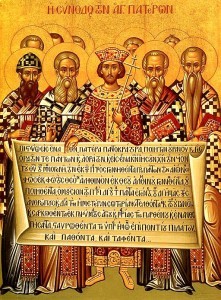
 The Council of Nicaea
The Council of NicaeaOn May 21 the Eastern Church celebrates the memory of my nominee for “Most Influential Christian”: Emperor Constantine the Great (272-337)
Why, you may ask, is the Roman Emperor venerated as a saint?
This guy who had the audacity to move the capital away from Rome, humbly renaming the city after himself?
This guy who set the pattern of the state meddling in the Church’s business?
Maybe you can measure the magnitude of his impact by the fact that people still argue about whether his influence was for good or for ill.
St. Constantine
There are several answers to why he’s St. Constantine. They have to do with lasting major impact, not perfection or lack of unforeseen consequences. I’m going to talk about three.
In one way or another they all come back to that picture up there. That’s a snapshot of the Holy Fathers at the end of the Council of Nicaea (325) — the first “Ecumenical Council” where representative bishops from across the world gathered to solve big problems and bring unity.
They all have halos of course. These are the people through whom the Holy Spirit worked to define the faith.
But notice that the guy in the middle also has a crown. That’s Constantine. When you are Emperor you get center stage.
1. Theological Influence
Their most famous product is the document they are holding on the banner: The Nicene Creed. It took its current form later, when another council added to it. But the 325 version expresses the heart of the faith as it has been proclaimed East and West ever since.
Notice that Constantine is pointing down to the text. If icons had speech bubbles he would be saying
I put that word in there!”
When the bishops were debating how to express the relationship between the Father and the Son Jesus Christ, Constantine provided the word that solved the problem:
homoousious.”
Christ is
of the same being” or “substance” or “nature”
as the Father. The Son is just as much God as the Father is God — always has been, always will be.
It might take more than a blog post to convince you, but that is a very big deal.
With that word the Emperor provided the theological vocabulary to define Trinitarian theology — and that means, he helped make sure we still understand Christ as the one capable of bringing salvation.
2. Creation of Unity
Okay, so Constantine gave us the word that defined core Christian theology. Still not convinced?
Constantine also called the Council of Nicaea. That means he used his civil authority to create a structure to help the Church. There were six more such Councils, the last in 787 — and they are the only such Councils to have authority in both the East and the West.
This system of governance through Church Councils of representative bishops created the most remarkable period of organic unity that Christianity has ever seen.
Imagine there being, basically (i.e., not counting a small number of offshoot regional bodies) one Church, in functional unity of teaching and practice.
In the Protestant world, with our thousands of denominations, we know nothing like it.
It might again take more than a blog post to convince you that this is a big deal. But Jesus put a lot of weight on organic unity. He prayed our unity would mirror the very life of the Trinity:
I in them and you in me, that they may become completely one, so that the world may know that you have sent me and have loved them even as you have loved me.” (John 17:23 NRSV)
Constantine helped that unity happen in a thoroughgoing way that lasted for a longer period than Protestantism has existed — it was intact globally until the year 1054 when Orthodox East and Catholic West divided. And granting that one division, the Orthodox East and Catholic West have each still maintained that unity remarkably. (I’m just sayin’.)
3. Structural Legal Change
Constantine is best known, though, for a change he made before calling the Council. It was a change that made the Council possible: Constantine made Christianity legal.
He didn’t make it the required religion — that was later. But with Constantine’s “Edict of Milan” in 313, Christians were no longer subject to persecution.
That’s a change.
Christians had not been constantly running from the authorities or living in hiding up to that point. But many did suffer torture and death in regional and national waves of persecution. And the lack of legal acceptability probably kept some from joining the movement.
With Constantine’s edict, the tenor of existence changed for the Church. You find prominent people getting on board. You find great church buildings growing.
Though he didn’t make Christianity a requirement, lifting the lid on the Church’s legal status set the direction for the Church to gain a great deal of social authority. It became, in many ways, the universal faith for vast regions — even if we might quibble about the Christian zeal of the average medieval citizen.
Constantine set in place advantages for the Church that only within recent decades have begun to dissolve. (It depends on which advantage, or which part of the world you think of. Some are quite gone; others are in place but crumbling.)
Our Post-Constantinian Era
So here’s to St. Constantine, my nominee for Most Influential Christian.
Welcome to the Post-Constantinian era. There is no more an assumption of universal Christian faith. It is a desert out there in terms of basic knowledge of the Christian faith, no matter how stridently confident the Christian voices in the media.
I’m okay with that — not that it would change if I objected. We still have the faith in the Triune God, the faith in a Christ who can save us, which Constantine helped define. We can still learn from the rich heritage of those who lived and wrote and sang and prayed and served in the stronger Church he helped and buttressed.
And if we are wise we’ll build on those gains, even without cultural advantages.
The point is not that we can’t be Christian without the culture’s help.
The point is faithful Christian discipleship. We need a truly Christian life in a complicated world that couldn’t care less.
That is how the Church grew and thrived before Constantine made it seem easy.
The post Most Influential Christian Nominee: Constantine appeared first on Gary Neal Hansen.
May 19, 2016
So Proud of Dr Naweji and Dr Ankrum!
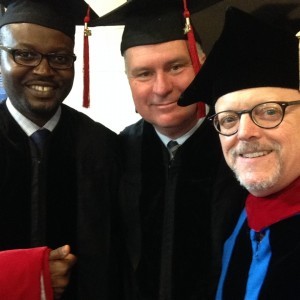
 Last Saturday was commencement. It is always a joy to see people I’ve taught sent out with their degrees, eager to serve Christ and the Church.
Last Saturday was commencement. It is always a joy to see people I’ve taught sent out with their degrees, eager to serve Christ and the Church.
This year, as well as my M.Div. and M.A.s, I had two Doctor of Ministry students graduating.
Here they are in a group selfie from just before marching in for the ceremony. They were still The Rev. Mr. Naweji and The Rev. Mr. Ankrum at this point.
Dr Naweji and Dr Ankrum
Nothing wrong with that at all. These guys could have continued perfectly well with just their M.Div.s.
Doing the D.Min. is a lot of work, and completely voluntary. They did it because they wanted to grow, to learn, and to serve Christ more effectively in their congregations.
I’m really proud of them.
We cooked up a pretty unusual D.Min., my teaching partner and I (I had the privilege of working with the inimitable and remarkable Rev. Dr. Joseph Small): Three years engaging with the best thinkers on the nature of the pastoral vocation from Patristic, Medieval, Reformation, and Modern times.
It was a wild ride. We wanted our students to engage with the riches of their heritage, both from the broader Christian tradition and from their own denominations. We wanted them to develop a theological understanding of ministry that drew on the best of the past and would work in the present.
These guys did it!
So let me tell you a bit about their projects.
Dr Naweji
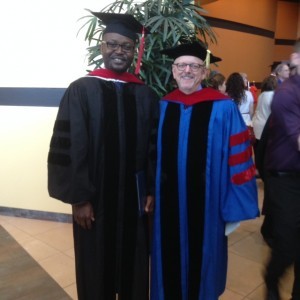 The Rev Dr Emmanuel Naweji
The Rev Dr Emmanuel NawejiEmmanuel Naweji is a native of The Democratic Republic of Congo, now a United Methodist elder pastoring two congregations in western Iowa.
His thesis:
The Ministry of United Methodist Pastors from the Democratic Republic of Congo Serving American United Methodist Churches: A Vision for Renewing United Methodist Ministry Drawn on Wesleyan and Congolese Experience
Yes, he got the special prize for longest title.
The long title came from an ambitious goal: He explored three defining aspects of the ministry of John Wesley, the amazing founder of the Methodist movement. He traced these priorities as Methodism moved through four contexts:
Original Methodism
19th century Methodist mission to the Congo
The fully Congolese United Methodist Church
Congolese ministers today ministering in the United States
He looked at how these priorities have continued and changed, and developed his own vision for thriving Methodist ministry.
Dr Ankrum
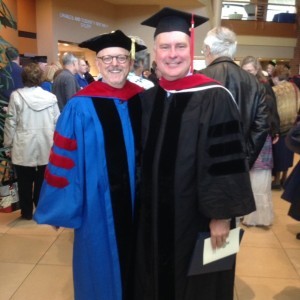 The Rev Dr Martin Ankrum
The Rev Dr Martin AnkrumMartin Ankrum is a native of Iowa, now serving as Pastor and Head of Staff in a big congregation in Western Pennsylvania. Since we were actually pals back at Princeton Seminary I was particularly honored that he signed up for the program.
His thesis:
The Teaching Elder: Recovering a Needed Pastoral Model
Martin is a Presbyterian, and our denomination recently changed the official titles of our ordained pastoral leaders from “Minister of Word and Sacrament” to “Teaching Elder.” It is a complicated story, but we revived an older title, both to better embody a Reformed understanding of ministry and to keep our attention on a crucial priority.
Martin’s thesis takes this change seriously digging into a variety of important historical mentors who strongly emphasized the teaching ministry. He does three great things in the process
He analyzes the deep need of churches for a coherent and focused teaching ministry. Without it, as he points out, even if we know that we believe we don’t know what we believe. It is hard to thrive that way — especially in the Reformed tradition.
He dives into John Calvin as a role model for this. The 16th Century reformer and pastor was at heart a teacher. That was his calling in Geneva, and that was his understanding of ministry: the Church is, by nature, a school for faithful discipleship, and it needs teachers.
He proposes a model for the 21st century pastor focused on the ministry of teaching — and he places it in the context of a pastor’s life that is not fractured and fragmented by the conflicting demands of congregations that want us to be marketers, managers, psychologists, and cruise directors.
Well done my friends.
I’m proud of you Dr Naweji and Dr Ankrum! You’ve taken on hard tasks and done well. May your investment repay you a hundredfold in a ministry that is true to your faith and effective in your context.
And I pray you find ways to bring your work to the benefit of the larger Church. God knows we need it.
The post So Proud of Dr Naweji and Dr Ankrum! appeared first on Gary Neal Hansen.
May 12, 2016
Making Friends in Seminary (Letters to a Young Pastor)

 WOW! My 1000 friends (cc by Andrew Kuznetsov 2.0)
WOW! My 1000 friends (cc by Andrew Kuznetsov 2.0)Dear ______:
Thanks for sharing your thoughts on my recent letter about making friends with John Calvin. I think you drew some conclusions that I wasn’t intending. Let me take a step back.
As a person in ministry, you need a lot of different kinds of friends — and seminary is a great place to meet them.
By starting this degree program you stepped into a zone of transition. Education is all about growth and change. That happens through relationships — with your peers, your teachers, and in the wider Church and world.
Some you’ll engage with face to face. Others at a distance. But you need to engage. You are investing too much in something too important to waste your time hunkering in the bunker.
Growth, after all, is always change. You need to enter that zone of transition with openness and wisdom so that the whole process is about becoming all God created you to be.
Making Friends in Seminary
So here’s what I think you should do: Actively seek five kinds of friends while you are there.
1. You need some friends who have some key similarities to you.
Everybody needs some people that sort of feel familiar — like when you are traveling in a country where you don’t speak the language well and bump into someone from your home town. Nurture friendships with a few people with whom you can share your excitement, puzzlement, and struggles; people with whom you can pray.
2. You need some friends who have some obvious differences from you.
Scripture portrays the Church as Christ’s body, with parts as different as toes and noses. We all are needed, and every single one shines with the glory of God — if only we have eyes to see. So nurture friendships with people who are clearly different in some key ways. Different cultures, ethnicities, genders, theological traditions, opinions. Grow close enough to pray together.
3. You need some friends who traveled with Christ a bit longer.
Real mentors who can offer personal guidance are extremely helpful. They are also a bit hard to find sometimes, so I’m suggesting something a little different: The Celtic Christians called them “soul friends.” These are people on the same journey with Christ as you are, but who have travelled a few more steps down the road. And they care about your journey.
You might find one in your field education supervisor or among your fellow students, but you should definitely look to the faculty.
You can’t expect to connect with every professor. But I hope you’ll end up with at least one professor who knows you well enough to be genuinely supportive and an encouraging — a real conversation partner as you grow in faith and ministry.
4. You need some friends who can be mentors-at-a-distance on specific topics.
Every class you take is going to introduce you to potential “distance” mentors in specific subjects — and every subject is going to connect with your emerging vocation in one way or another.
I don’t mean your professors here. I mean the authors of the books they introduce you to. Those books bring the voices of the authors into your world. They will all be there on your shelf, ready to provide wise counsel on preaching, or biblical studies, or pastoral care, or whatever.
Say you end up having to prepare a sermon every week. You can be glad if your professor introduced you to a modern preacher like Barbara Brown Taylor, or an ancient preacher like St. John Chrysostom. For the rest of your life you can learn from them. Read how they preached your text. Read one of their sermons each day as part of your devotions. It is going to help.
So don’t think of your assigned readings as something to check off on your way to an exam or paper. Think of each author as a potential friend. (And if they are alive, they probably have a website. They would love to hear from you.)
5. You need at least one life-long friend who has wrestled with more and bigger and better questions.
What I wrote to you about Calvin brings us to the fifth kind of friend you need from seminary: At least one Christian who wrestled with very big questions for a very long time, and left you a shelf of books to explore.
You need to follow your own inclination in this, finding someone who is a friend of the heart — if you are passionate about the spiritual life, for instance, you might choose St. Teresa of Avila. She did not leave too many books, but enough for her to be recognized by the Catholic Church as one of their official “Doctors” or teachers of the faith.
But there are three figures who are especially worth considering, both because they wrote on a vast range of topics and because they had an enormous influence. And I recommend them because I know you.
Think of them as your Theological ABCs:
Augustine.
Barth.
Calvin.
You won’t like everything that any one of them says. But you will always find them asking good questions about things that go to the heart of faith and discipleship. Even if you are in a very different place from the friend you choose (and you are — ours is a different age) their questions and their answers have shaped the Church around you.
Life is better with friends. Invest in making good ones.
Blessings,
Gary
————
This post contains affiliate links. (That means if you click through and buy something, Amazon sends me a tiny commission.)
The post Making Friends in Seminary (Letters to a Young Pastor) appeared first on Gary Neal Hansen.



